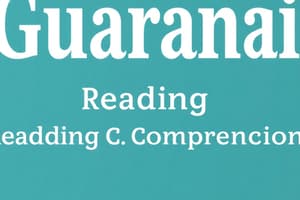Podcast
Questions and Answers
What is a key characteristic of academic texts?
What is a key characteristic of academic texts?
- They are primarily written for entertainment.
- They often use subjective and personal language.
- They avoid listing references.
- They provide facts and evidence from credible sources. (correct)
Which of the following is NOT a goal of reading academic texts?
Which of the following is NOT a goal of reading academic texts?
- To get ideas that can support a writing assignment.
- To gain more information.
- To better understand existing ideas.
- To exclusively read for leisure. (correct)
What strategy should you use before reading an academic text?
What strategy should you use before reading an academic text?
- Identify the type of text. (correct)
- Skim the text quickly for enjoyment.
- Assume the author's intent.
- Read the last paragraph first.
What is the purpose of using hedging language in academic writing?
What is the purpose of using hedging language in academic writing?
What should you do to engage actively with academic texts?
What should you do to engage actively with academic texts?
What is a common type of academic text used for presenting personal research in a degree program?
What is a common type of academic text used for presenting personal research in a degree program?
Which of the following describes the content style of academic writing?
Which of the following describes the content style of academic writing?
In critical reading, what should you aim to identify?
In critical reading, what should you aim to identify?
What is the purpose of identifying the author's limitations in their argument?
What is the purpose of identifying the author's limitations in their argument?
Which reading strategy encourages skimming the text before diving into specifics?
Which reading strategy encourages skimming the text before diving into specifics?
What is the primary goal of creating a vocabulary bank during reading?
What is the primary goal of creating a vocabulary bank during reading?
Which strategy helps in connecting new knowledge from the reading to what you already know?
Which strategy helps in connecting new knowledge from the reading to what you already know?
What does it mean to activate prior knowledge before reading?
What does it mean to activate prior knowledge before reading?
What is an effective way of evaluating an author's reliability?
What is an effective way of evaluating an author's reliability?
Which component of the SQ3R method helps to formulate questions based on headings?
Which component of the SQ3R method helps to formulate questions based on headings?
Highlighting key points while reading primarily aims to achieve which of the following?
Highlighting key points while reading primarily aims to achieve which of the following?
Flashcards are hidden until you start studying
Study Notes
Academic Texts Overview
- Distinction between academic reading and leisure reading; academic texts require deeper comprehension.
- Types of academic texts include:
- Articles: Published in scholarly journals, contributing to research and societal development.
- Conference Papers: Presented at academic conferences, often revised for journal publication.
- Reviews: Evaluate and review previously published scholarly work.
- Theses/Dissertations: Personal research by candidates for academic degrees.
Reading Goals
- Understand existing ideas and theories.
- Gather supportive information for writing assignments.
- Identify gaps in current research.
- Connect new ideas to previous knowledge.
Content and Style of Academic Text
- Pose critical questions and issues.
- Provide evidence from credible sources.
- Use precise vocabulary and avoid jargon.
- Maintain objectivity, avoiding personal bias.
- Cite references accurately.
- Employ hedging language to moderate claims.
Critical Reading Strategies
-
Before Reading:
- Identify the academic text type (journal article, textbook, etc.).
- Clarify your purpose for reading the text.
- Understand the author's intent.
- Predict the main idea based on the title.
- Reflect on your initial reactions to the text.
- Activate prior knowledge about the topic.
- Consider the target audience’s influence on the text.
- Use graphic organizers for visual representation of thoughts.
-
While Reading:
- Highlight and underline significant points.
- Note any confusions or questions for later review.
- Identify any limitations in the author's arguments.
- Evaluate the reliability and objectivity of the text.
- Build a vocabulary bank with new terms and definitions.
- Summarize main arguments at the end of sections.
- Analyze main ideas along with supporting evidence.
Post-Reading Reflection and Engagement
- Reflect on key takeaways from the text.
- Write personal reactions to specific sections.
- Discuss insights with peers or instructors for diverse perspectives.
- Connect the main ideas to prior knowledge and experiences.
SQ3R Reading Strategy
- Survey: Skim the text, examine headings, and review diagrams for key information.
- Question: Annotate headings and formulate questions to guide reading comprehension.
Studying That Suits You
Use AI to generate personalized quizzes and flashcards to suit your learning preferences.




